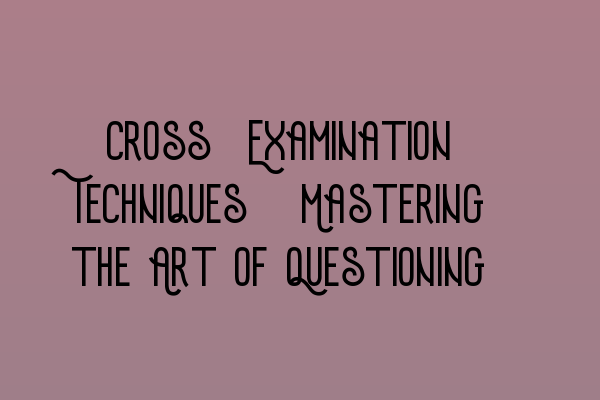Cross-Examination Techniques: Mastering the Art of Questioning
Welcome to our SQE Criminal Law & Practice Law UK blog, where we provide expert advice and insights for aspiring solicitors. In today’s post, we will delve into the world of cross-examination techniques and how to master the art of questioning. Cross-examination is a fundamental skill for any criminal lawyer, and it can make or break a case. So, let’s explore some effective techniques that will help you become a master of cross-examination.
The Importance of Cross-Examination
Cross-examination plays a crucial role in the criminal trial process. It is the opportunity for the defense to challenge the credibility and reliability of the prosecution’s witnesses. Effective cross-examination can expose inconsistencies, biases, and gaps in the witness’s testimony, undermining their credibility in front of the judge and jury. It is a powerful tool that can turn the tide of a case in favor of the defense.
Preparing for Cross-Examination
Preparation is key when it comes to cross-examination. Before the trial, thoroughly review all the relevant evidence, witness statements, and case files. Identify the key issues in the case and develop a list of questions that will help you challenge the prosecution’s case. Make sure to anticipate potential objections and have a strategy in place to respond to them.
During your preparation, it is essential to remain objective and open-minded. Consider all possible scenarios and outcomes, and be prepared to adapt your strategy in response to the witness’s answers. Familiarize yourself with the rules of evidence, as well as the specific rules governing cross-examination in your jurisdiction.
Effective Questioning Techniques
Now let’s dive into some effective questioning techniques that will help you master the art of cross-examination:
- Leading Questions: Use leading questions to control the pace and direction of the questioning. These are questions that suggest the desired answer and do not allow the witness much room to elaborate. For example, “Isn’t it true that you were at the scene of the crime on the night in question?” This technique can be particularly effective in challenging the witness’s version of events.
- Impeachment: When cross-examining a witness, look for inconsistencies or contradictions in their testimony compared to their previous statements. Impeach the witness by confronting them with these inconsistencies and challenging their credibility. Use their own words against them to undermine their testimony.
- Cross-Examination in Layers: Divide your cross-examination into smaller segments or layers, each focusing on a specific issue or topic. Start with broader questions to establish a foundation and then gradually move towards more detailed and specific questions. This technique helps build a coherent narrative and allows you to delve deeper into the weaknesses of the witness’s testimony.
- Control the Witness: Maintain control over the witness by limiting their ability to provide lengthy narratives or explanations. Interrupt and redirect their answers when necessary to keep the focus on your line of questioning. This technique ensures that you maintain control of the courtroom and prevent the witness from veering off course.
- The Art of Silence: Sometimes, the most effective technique is silence. After asking a challenging question, allow for a moment of silence to create tension and encourage the witness to fill the void. Often, witnesses feel compelled to explain or elaborate, inadvertently revealing more than they intended. Embrace the power of silence and use it to your advantage.
Conclusion
Mastering the art of cross-examination is a lifelong journey for any criminal lawyer. It requires meticulous preparation, a deep understanding of the case, and the ability to think on your feet. By incorporating these effective questioning techniques into your cross-examination strategy, you will be well-equipped to challenge the prosecution’s witnesses and present a strong defense for your clients.
For further insights and guidance on criminal law and the solicitors qualifying examination (SQE), check out our related articles:
- Legal Representation for Delaware LLCs in the UK: Expert Advice
- SQE Exam Prep: Essential Study Materials for Aspiring Solicitors
- Expert Testimonies in UK Courts: Building Strong Cases
- Demystifying the Solicitors Qualifying Examination Format
- SQE Exam for International Lawyers: Challenges and Success Strategies
Thank you for reading our blog post on cross-examination techniques. Stay tuned for more valuable content and insights from SQE Criminal Law & Practice Law UK!
